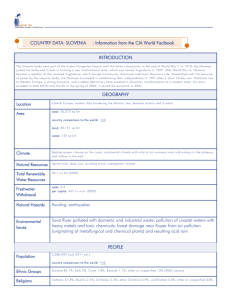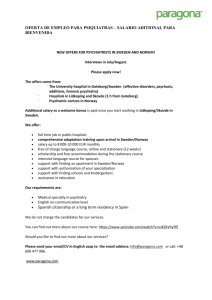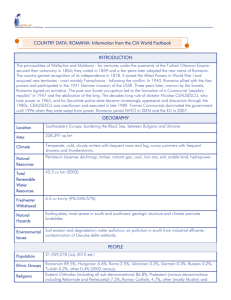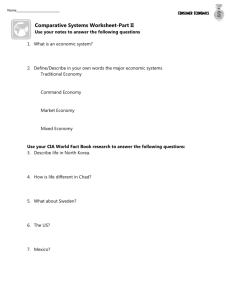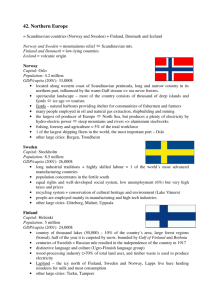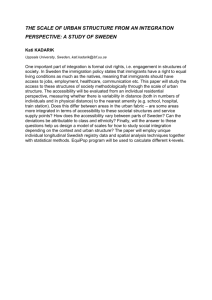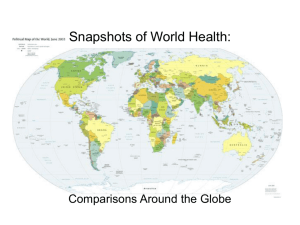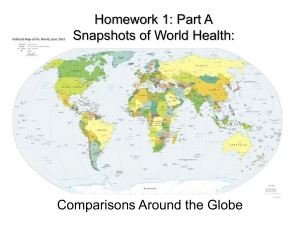INTRODUCTION GEOGRAPHY PEOPLE COUNTRY DATA: Sweden
advertisement
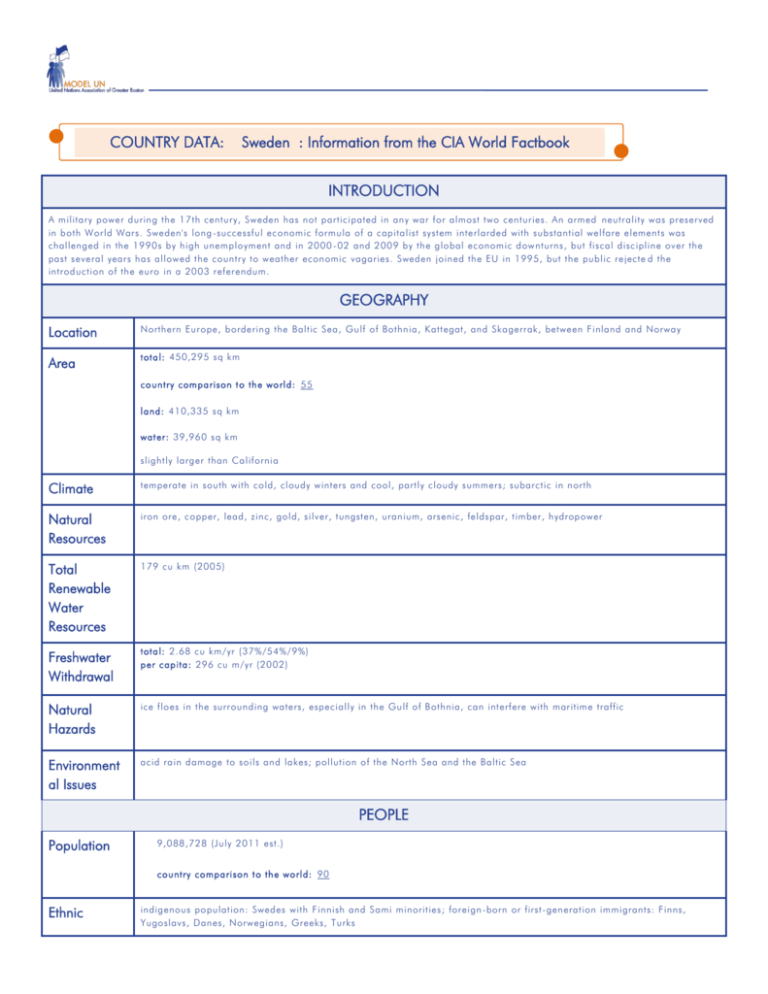
COUNTRY DATA: Sweden : Information from the CIA World Factbook INTRODUCTION A military power during the 17th century, Sweden has not participated in any war for almost two centuries. An armed neutrality was preserved in both World Wars. Sweden's long -successful economic formula of a capitalist system interlarded with substantial welfare elements was challenged in the 1990s by high unemployment and in 2000 -02 and 2009 by the global economic dow nturns, but fiscal discipline over the past several years has allowed t he country t o weather economic vagaries. Sweden joined the EU in 1995, but the public rejecte d the introduction of the euro in a 2003 referendum. GEOGRAPHY Location Northern Europe, bordering the Balt ic Sea, Gulf of Bothnia, Kattegat, and Skagerrak, between F inland and Norway Area total: 450,295 sq km country comparison t o the world: 55 land: 410,335 sq km wat er: 39,960 sq km slight ly larger than California Climate temperat e in south with cold, cloudy winters and cool, partly cloudy summers; subarctic in north Natural Resources iron ore, copper, lead, zinc, gold, silver, tungsten, uranium, arsenic, feldspar, timber, hydropower Total Renewable Water Resources 179 cu km (2005) Freshwater Withdrawal total: 2.68 cu km/yr (37%/54%/9%) per capita: 296 cu m/yr (2002) Natural Hazards ice floes in the surrounding waters, especially in the Gulf of Bothnia, can interfere with maritime traffic Environment al Issues acid rain damage to soils and lakes; pollution of the North Sea and the Baltic Sea PEOPLE Population 9,088,728 (July 2011 est.) country comparison t o the world: 90 Ethnic indigenous populat ion: Swedes with F innish and Sami minorities; foreign -born or first-generation immigrants: F inns, Yugoslavs, Danes, Norwegians, Greeks, Turks Groups Religions Lutheran 87%, other (includes Roman Catholic, Orthodox, Baptist, Muslim, Jewish, and Buddhist) 13% Languages Swedish (official), small Sami- and Finnish-speaking minorities Literacy Rate definit ion: age 15 and over can read and write total populat ion: 99% male: 99% female: 99% (2003 est.) Major Infectious Diseases N/A GOVERNMENT Type constitut ional monarchy Independenc e 6 June 1523 (Gustav VASA elect ed king) Constitution 1 January 1975 Legal System civil law syst em influenced by customary law; accepts compulsory ICJ jurisdiction with reservations ECONOMY Agricultural Products barley, wheat, sugar beet s; meat , milk Industries iron and steel, precision equipment (bearings, radio and telephone parts, armaments), wood pulp and paper products, processed foods, mot or vehicles Import commodities machinery, petroleum and petroleum products, chemicals, mo tor vehicles, iron and steel; foodstuffs, clothing Import Partners Germany 17.9%, Denmark 8.9%, Norway 8.7%, Netherlands 6.17%, UK 5.56%, F inland 5.14%, France 5.06%, China 4.79% (2009) Export Commodities machinery 35%, motor vehicles, paper products, pulp and wood, iron and steel products, chemicals Export Partners Norway 10.61%, Germany 10.2%, UK 7.45%, Denmark 7.35%, Finland 6.44%, US 6.36%, France 5.05%, Netherlands 4.67% (2009) Per Capita GDP $39,000 (2010 est.) country comparison t o the world: 23 $37,500 (2009 est.) $39,600 (2008 est.) note: data are in 2010 US dollars Population below poverty line NA% *CITATIONS: All information included above is extracted from the CIA World Factbook except where noted. Country Data: Information from Human Development Report COUNTRY: Sweden General Life Expectancy at Birth (in years) 81.3 Average number of years in School (in years) 11.6 Gross National Income Per Capita (In US Dollars) 36,936 Gender Inequality Female Seats in Parliament (%) 47.0 Population with at least a Secondary Education Female (% 0f 25 and older) 87.9 Population with at least a Secondary Education Male (% 0f 25 and older) 87.1 Labor Force Participation Female (%) 77.1 Labor Force Participation Male (%) 81.8 Births Attended by Skilled Health Professionals (%) .. Poverty Population surviving on $1.25 per day (%) .. Empowerment Number of Journalists Imprisoned 0 Corruption Victims (% of people who face a bribe situation in the last year) Political Engagement (% percent of people who voiced opinion to public officials) 6 29 Sustainability Fossil Fuels as Primary Energy Source (%) 33 Renewable Resources as Primary Energy Source (%) 31 Population without Access to Water (%) 0 Population Without Access to Sanitation Services (%) 0 Less than 0.01 Population affected by natural disasters (% between 2000-2009) Human Security Number of Refugees leaving this country 0.0 Number of Internally Displaced People in This Country .. Prevalence of Undernourishment (%) Less than 5 Demographics Urban Residents (% of total Population) 84.7 Health HIV Prevalence in Female Youth (% ages 15-24) 0.1 HIV Prevalence in Male Youth (% ages 15-24) 0.1 HIV Prevalence in Adults (% ages 15-49) 0.1 Other Official Development Assistance Per Capita (in US dollars) .. Population without Electricity (%) ..
